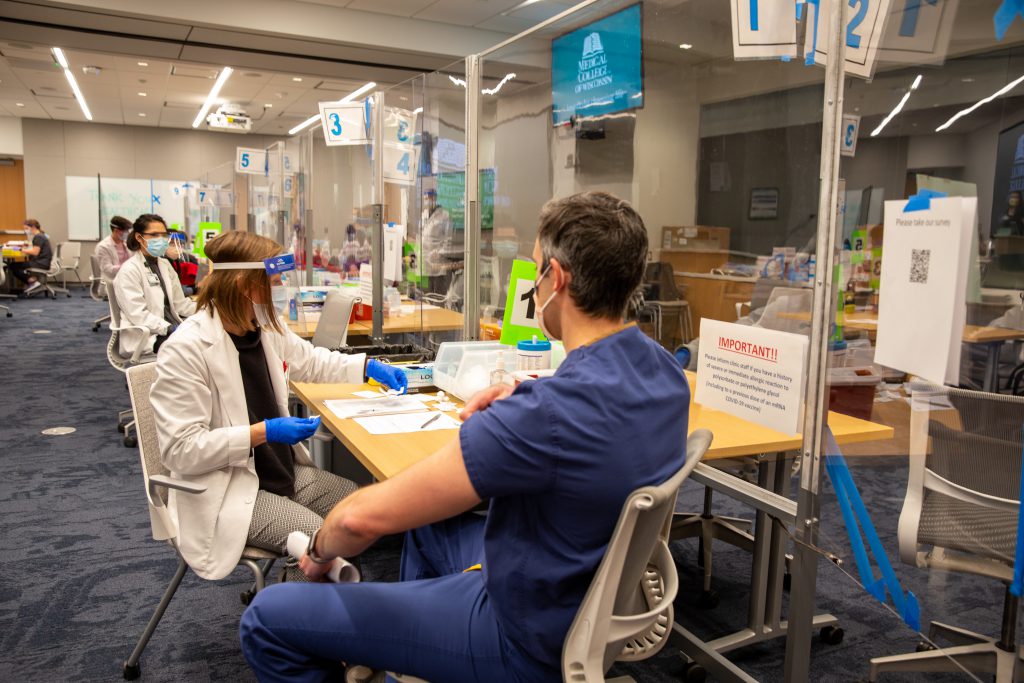State Expands Eligibility for Vaccination
Proposal for next phase expands eligibility for vaccines to nearly half the population.

Dr. Ben Weston receives second dose of COVID-19 vaccine. File photo courtesy of the Medical College of Wisconsin.
If the latest draft of recommendations for the next phase of vaccinations is accepted by the state Department of Health Services, nearly half the state’s adult population will be eligible for the vaccine.
The state committee responsible for developing draft recommendations for the next phase of vaccinations met this morning and added new groups to a list that was released last week for public comment.
The expansion of the group demonstrates a change in the state’s vaccination strategy, as phase 1b was initially meant to be the same size as phase 1a.
There was some concern expressed by members of the Vaccine Subcommittee Wednesday morning surrounding some groups that were left out of eligibility coupled with the ballooning of the population included.
“If we look at the rollout of vaccine, it’s gonna be a very, very long time for this target to be hit,” said Dr. Jon Temte associate dean for public health and community engagement for UW-Madison School Medicine and Public Health, and co-chair of the subcommittee.
Last week, the committee approved a list of recommended 1b groups that included IRIS and Family Care Recipients, residents and staff of congregant living facilities, frontline essential workers — such as non-EMS first responders, education and childcare workers — and workers involved in mink husbandry. The last group presents a serious biosecurity threat because of the risk of transmission and genomic changes to the virus.
This week, DHS announced that all residents aged 65 or older would be eligible for the vaccine.
After receiving nearly 5,000 individual public comments on this list, the majority of the committee voted to add the following to the list: 911 operators, public transit workers and food supply workers.
Public Transit workers — defined by the committee as bus drivers and other mass transit workers that come in contact with the public — were added because they are a critical link to healthcare, employment and other essential trips for huge chunks of the state’s population.
There was some discussion at committee of adding airline employees that actually work on commercial airplanes and rideshare drivers, but the size of these populations were unknown to the committee and some members were leery of further ballooning the population in phase 1b.
Food supply workers were added after the committee received much public comment. Ann Lewandowski, co-chair of the committee said the public comments showed “overwhelming support” for food supply workers, which includes grocery store workers, agricultural workers and hunger relief workers — such as food pantry staff or volunteers.
Congregant living facilities, which include homeless shelters, transitional living facilities and corrections institutions, became an issue after the committee received many comments from the public showing outrage that incarcerated people would be part of the next phase for vaccinations.
Despite this, the CDC’s Advisory Committee on Immunization Practices (ACIP) definition of congregant living facilities includes corrections facilities. Daryl Daane, pharmacy director for the state Department of Corrections (DOC) and a member of the committee said state and federal corrections facilities are legally required to give prisoners the same level of healthcare that would be available to them if they were free. In fact, he said, failing to do this would be a violation of the 8th Amendment of the U.S. Constitution which prohibits “cruel and unusual punishment.”
Temte agreed, noting inmates are already being punished for their crimes, and treating them differently than other residents of congregant living facilities would constitute a double punishment.
“Incarcerated populations are the one group that have a constitutional right to healthcare,” said Mary Muse, DOC chief nursing officer, director of nursing, and “we cannot take that away from them.”
At the close of the meeting, Dr. Ed Belongia, director of the Marshfield Clinic Center for Clinical Epidemiology & Population Health, said “it troubles me that some of the people who are still at high risk of dying from COVID-19 are not included in this group.”
Belongia made clear he felt the essential workers on the list deserved protection. “But we’re not protecting people with cancer, we’re not protecting people with heart disease, with kidney disease etc.” he said. “And yet, they’re the ones who are most at risk of the really severe outcomes.”
More about the Coronavirus Pandemic
- Governors Tony Evers, JB Pritzker, Tim Walz, and Gretchen Whitmer Issue a Joint Statement Concerning Reports that Donald Trump Gave Russian Dictator Putin American COVID-19 Supplies - Gov. Tony Evers - Oct 11th, 2024
- MHD Release: Milwaukee Health Department Launches COVID-19 Wastewater Testing Dashboard - City of Milwaukee Health Department - Jan 23rd, 2024
- Milwaukee County Announces New Policies Related to COVID-19 Pandemic - County Executive David Crowley - May 9th, 2023
- DHS Details End of Emergency COVID-19 Response - Wisconsin Department of Health Services - Apr 26th, 2023
- Milwaukee Health Department Announces Upcoming Changes to COVID-19 Services - City of Milwaukee Health Department - Mar 17th, 2023
- Fitzgerald Applauds Passage of COVID-19 Origin Act - U.S. Rep. Scott Fitzgerald - Mar 10th, 2023
- DHS Expands Free COVID-19 Testing Program - Wisconsin Department of Health Services - Feb 10th, 2023
- MKE County: COVID-19 Hospitalizations Rising - Graham Kilmer - Jan 16th, 2023
- Not Enough Getting Bivalent Booster Shots, State Health Officials Warn - Gaby Vinick - Dec 26th, 2022
- Nearly All Wisconsinites Age 6 Months and Older Now Eligible for Updated COVID-19 Vaccine - Wisconsin Department of Health Services - Dec 15th, 2022
Read more about Coronavirus Pandemic here





















